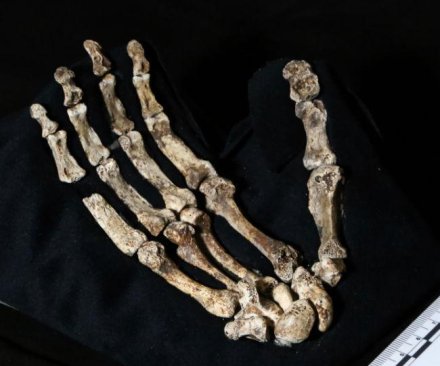 Scientists say they've discovered a new member of the human family tree, revealed by a huge trove of bones in a barely accessible, pitch-dark chamber of a cave in South Africa.
Scientists say they've discovered a new member of the human family tree, revealed by a huge trove of bones in a barely accessible, pitch-dark chamber of a cave in South Africa.
The creature shows a surprising mix of human-like and more primitive characteristics — some experts called it "bizarre" and "weird."
And the discovery presents some key mysteries: How old are the bones? And how did they get into that chamber, reachable only by a complicated pathway that includes squeezing through passages as narrow as about 7½ inches (17.8 centimeters)?
The bones were found by a spelunker, about 30 miles (48 kilometers) northwest of Johannesburg. The site has yielded some 1,550 specimens since its discovery in 2013. The fossils represent at least 15 individuals.
Researchers named the creature Homo naledi (nah-LEH-dee). That reflects the "Homo" evolutionary group, which includes modern people and our closest extinct relatives, and the word for "star" in a local language. The find was made in the Rising Star cave system.


 In the middle of the 7th century, a plague swept through the walled city of Jerash,...
In the middle of the 7th century, a plague swept through the walled city of Jerash,... A newly discovered species of large dinosaur lived in marshy areas, hunted for fish and had...
A newly discovered species of large dinosaur lived in marshy areas, hunted for fish and had... On February 26, 2025, a NASA probe called Lunar Trailblazer lifted off from Kennedy Space Center...
On February 26, 2025, a NASA probe called Lunar Trailblazer lifted off from Kennedy Space Center... She navigated segregation to become an esteemed mathematician — and today, her work helps billions of...
She navigated segregation to become an esteemed mathematician — and today, her work helps billions of...






























